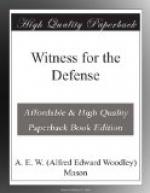Henry Thresk for his part knew that it was not merely difficult, it was, in fact, impossible. Mr. Pettifer had read the evidence with an accurate discrimination. The plea of self-defence was here foreshadowed and it was just the certainty that the defence was going to rely upon it for a verdict which had brought Henry Thresk himself into the witness-box at Bombay. Given all that was known of Stephen Ballantyne and of the life he had led his unhappy wife, the defence would have been a good one, but for a single fact—the discovery of Ballantyne’s body outside the tent. No plea of self-defence could safely be left to cover that. Thresk himself wondered at it. It struck at public sympathy, it seemed the act of a person insensate and vindictive. Therefore he had come forward with his story. But Mr. Pettifer was not to know it.
“There are three things for you to remember,” said Thresk. “In the first place it is too early to assume that self-defence was going to be the plea. Assumptions in a case of this kind are very dangerous, Mr. Pettifer. They may lead to an irreparable injustice. We must keep to the fact that no plea of self-defence was ever formulated. In the second place Mrs. Ballantyne was brought down to Bombay in a state of complete collapse. Her married life had been a torture to her. She broke down at the end of it. She was indifferent to anything that might happen.”
Pettifer nodded. “Yes, I can understand that.”
“It followed that her advisers had to act upon their own initiative.”
“And the third point?” Pettifer asked.
“Well, it’s not so much a point as an opinion of mine. But I hold it strongly. Her counsel mishandled the case.”
Pettifer pursed up his lips and grunted. He tapped a finger once or twice on the table in front of him. He looked towards Thresk as if all was not quite said. Harold Hazlewood, to whom the position of a neglected listener was rare and unpalatable, saw an opportunity for intervention.
“The three points are perhaps not very conclusive,” he said.
Thresk turned towards him coldly:
“I promised to answer such questions as Mr. Pettifer put to me. I am doing that. I did not undertake to discuss the value of my answers afterwards.”
“No, no, quite so,” murmured Mr. Hazlewood. “We are very grateful, I am sure,” and he left once more the argument to Pettifer.
“Then I come to the next question, Mr. Thresk. At some moment in this inquiry you of your own account put yourself into communication with Mrs. Ballantyne’s advisers and volunteered your evidence?”
“Yes.”
“Isn’t it strange that the defence did not at the very outset get into communication with you?”
“No,” replied Thresk. Here he was at his ease. He had laid his plans well in Bombay. Mr. Pettifer might go on asking questions until midnight upon this point. Thresk could meet him. “It was not at all strange. It was not known that I could throw any light upon the affair at all. All that passed between Ballantyne and myself passed when we were alone; and Ballantyne was now dead.”




